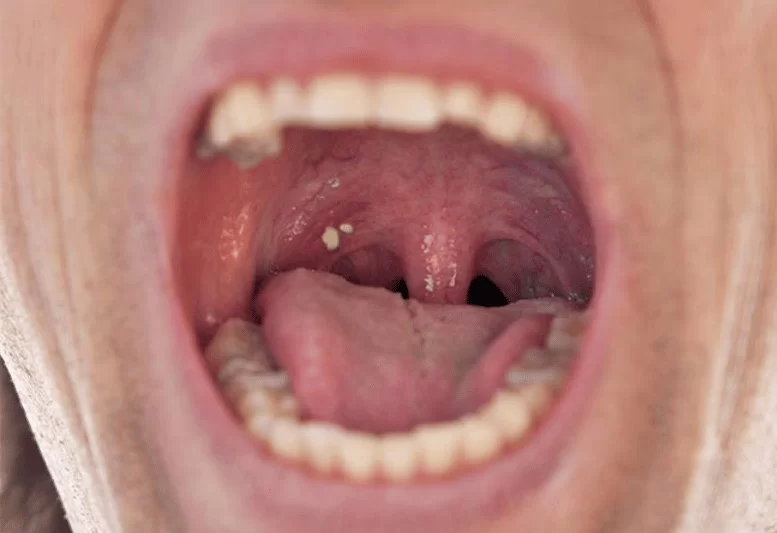
Do Tonsil Stones Mean Bad Oral Hygiene? Here's What You Need to Know
1. What Are Tonsil Stones?
Tonsil stones, also known as tonsilloliths, are small, hard deposits that form in the crevices of your tonsils. These stones are usually made up of a combination of bacteria, dead cells, mucus, and food particles that get trapped in the tonsil crypts. Over time, these particles can harden, creating small, white or yellowish stones.
While tonsil stones are typically harmless, they can cause a variety of issues, including bad breath, a sore throat, and a feeling of something being stuck in the back of your throat. They are often a source of discomfort, but do they mean you're not practicing good oral hygiene? Let’s take a deeper dive into this common question.
2. Are Tonsil Stones a Sign of Bad Oral Hygiene?
The presence of tonsil stones can certainly raise concerns about oral hygiene, but they don't necessarily mean you're neglecting your dental care. While poor oral hygiene can contribute to the formation of tonsil stones, there are other factors at play as well. Let’s break it down:
2.1 The Role of Oral Hygiene
Maintaining good oral hygiene—brushing your teeth twice a day, flossing, and using mouthwash—can help reduce the likelihood of food particles and bacteria becoming trapped in the tonsils. Poor oral hygiene can lead to a buildup of bacteria in the mouth, which may increase the chances of developing tonsil stones. Additionally, if you don't brush your tongue or the roof of your mouth, you may be leaving behind bacteria that contribute to tonsil stone formation.
2.2 The Anatomy of the Tonsils
Your tonsils have small pockets or crevices called crypts where debris, bacteria, and dead cells can get trapped. Some people naturally have larger crypts that are more prone to collecting particles, which may lead to tonsil stone formation. In these cases, tonsil stones can develop even with proper oral hygiene. Genetics, therefore, also play a role in the formation of these stones.
2.3 Chronic Conditions and Their Impact
In some cases, chronic conditions like post-nasal drip, allergies, or sinus infections can contribute to the formation of tonsil stones. Mucus from the nose can drip down into the throat, where it may get trapped in the tonsil crypts. This mucus can then contribute to the buildup of tonsil stones, regardless of how diligent you are about your oral hygiene.
3. How to Prevent Tonsil Stones
If you're concerned about tonsil stones and want to prevent them from forming, there are several steps you can take. While tonsil stones aren't always entirely avoidable, these practices can help minimize the risk:
3.1 Maintain Excellent Oral Hygiene
Brushing your teeth, gums, and tongue thoroughly at least twice a day is essential. Flossing daily removes food particles and plaque between your teeth, while using mouthwash can kill bacteria in your mouth and reduce bad breath. It's also a good idea to rinse your mouth with saltwater, which can help dislodge any small particles that may get stuck in your tonsils.
3.2 Stay Hydrated
Drinking plenty of water throughout the day helps wash away food particles and bacteria in the mouth, which can reduce the chances of tonsil stones developing. A dry mouth encourages bacteria growth, so keeping your mouth moist is essential for good oral health.
3.3 Avoid Smoking and Alcohol
Smoking and excessive alcohol consumption can lead to dry mouth and an increase in bacteria in the mouth. Smoking, in particular, also increases the risk of developing respiratory infections that could contribute to tonsil stone formation. Quitting smoking and limiting alcohol intake can significantly improve your oral and overall health.
3.4 Regular Dental Checkups
Visiting your dentist regularly for checkups and cleanings is crucial to maintaining good oral hygiene. Your dentist can help identify any potential issues, such as gum disease or cavities, that could contribute to tonsil stone formation. They can also give you personalized advice on how to keep your mouth healthy and free of bacteria.
4. What to Do If You Have Tonsil Stones
If you suspect you have tonsil stones, it's important to take action early to prevent discomfort or infection. Here are some options for dealing with tonsil stones:
4.1 At-Home Remedies
Many people use at-home remedies to remove tonsil stones, such as using a cotton swab or the back of a toothbrush to gently push the stones out. Gargling with warm salt water or using a water flosser to flush out the stones can also be effective. If the stones are small and easily accessible, these methods may work well for you.
4.2 When to See a Doctor
In some cases, tonsil stones may become large, painful, or infected. If at-home remedies don’t work, it’s time to consult an ENT (ear, nose, and throat) specialist. In more severe cases, a doctor may recommend a tonsillectomy (removal of the tonsils) to prevent recurring tonsil stones.
5. Real-Life Story: A Journey with Tonsil Stones
Let’s consider the case of Emily, a 28-year-old woman who had been struggling with tonsil stones for years. Emily maintained a solid oral hygiene routine, brushing and flossing twice a day, and even used mouthwash regularly. Yet, she still suffered from tonsil stones, especially during allergy season when her post-nasal drip worsened.
Frustrated by recurring bouts of bad breath and the discomfort of tonsil stones, Emily sought help from a specialist. After an in-depth evaluation, the doctor discovered that Emily's tonsils had deep crypts, making it easier for debris to become trapped. Although she maintained excellent oral hygiene, the anatomical structure of her tonsils made her more susceptible to developing tonsil stones.
Emily’s doctor recommended a few lifestyle changes, including regular saltwater gargles and staying extra hydrated, especially during allergy season. By following these tips and staying on top of her oral care, Emily was able to reduce the frequency of tonsil stones and live a more comfortable life.
6. Why Choose Family Dentistry Online for Your Oral Health Needs
At Family Dentistry Online, we understand how important your oral health is. Our team of experienced dental professionals offers a wide range of services to help you maintain healthy teeth and gums, including personalized advice on preventing tonsil stones and other oral health issues.
Visit our website to learn more about how we can help you take care of your oral hygiene and overall health. We provide resources and tips on keeping your mouth clean, fresh, and free of tonsil stones, ensuring your comfort and well-being.







 White Pine Dental4.0 (1076 review)
White Pine Dental4.0 (1076 review) Mark C Svore & Associates4.0 (22 review)
Mark C Svore & Associates4.0 (22 review) Familia Dental4.0 (458 review)
Familia Dental4.0 (458 review) Axiom Dentistry4.0 (314 review)
Axiom Dentistry4.0 (314 review) Loretto Multi-Specialty Dental Center4.0 (111 review)
Loretto Multi-Specialty Dental Center4.0 (111 review) West Covina Dental Group and Orthodontics4.0 (274 review)
West Covina Dental Group and Orthodontics4.0 (274 review) The Importance of Oral Health Education During Pregnancy for a Healthy Pregnancy
The Importance of Oral Health Education During Pregnancy for a Healthy Pregnancy Best Tips for Brushing Your Teeth Properly for Healthy Gums: Essential Techniques for Oral Health
Best Tips for Brushing Your Teeth Properly for Healthy Gums: Essential Techniques for Oral Health Why Skipping Dental Checkups Can Lead to Bigger Oral Health Problems
Why Skipping Dental Checkups Can Lead to Bigger Oral Health Problems Advantages of Porcelain Dental Restorations
Advantages of Porcelain Dental Restorations How Can Diabetes Cause Tooth and Gum Problems? Preventing and Managing Oral Health Issues
How Can Diabetes Cause Tooth and Gum Problems? Preventing and Managing Oral Health Issues Healthy Habits for Promoting Good Oral Health and Hygiene: Tips for a Healthy Smile
Healthy Habits for Promoting Good Oral Health and Hygiene: Tips for a Healthy Smile